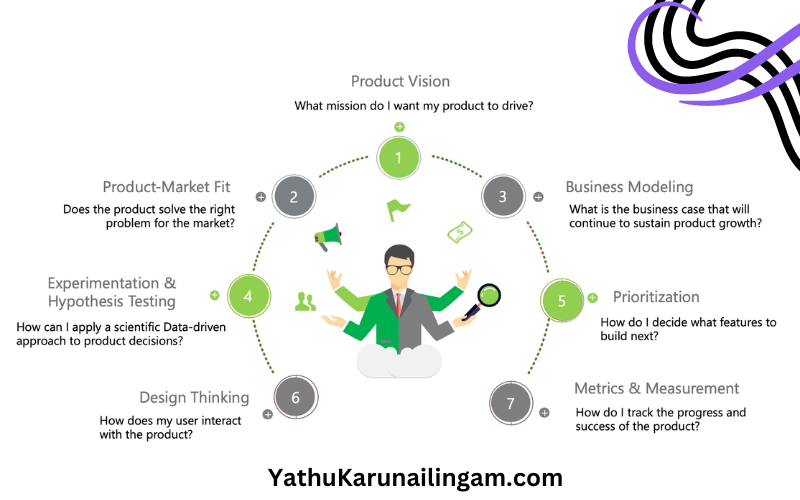- September 19, 2024
- by uyuwh
- Blog
- 0 Comments
Have you ever wondered what does a Product Manager do? Product managers are crucial in creating products that people love. Product managers are the glue holding departments together. They ensure that a product is aligned with business goals and meets market demands. This guide explores the daily responsibilities of product managers, the required skills and their impact on the success of a business.
Table of Contents
What Does a Product Manager Do?
What does a Product Manager do? The role is primarily concerned with overseeing the lifecycle of the product. Product managers are involved in every stage of the product life cycle, from brainstorming the original concept to analyzing feedback after launch. Product managers work at the intersection between customer needs, business goals and market trends in order to create products that are not only successful but also survive in a competitive marketplace.
Strategic Vision and Market Understanding
The product manager is the brains behind any product. They create a vision of what the product is and who it is for. This isn’t just an idea. It’s based on market research, competitor analysis, and a thorough understanding of the customer pain points.
- Strategic Planning: They develop a roadmap which outlines the key features and milestones that will be included in the product. This roadmap keeps everyone on track and focused.
- Understanding the competitive landscape plays a major role in market positioning. They must identify what makes their product unique and how they can provide a unique value for customers.
Key Responsibilities for a Product Manager
Market research and customer analysis
Research is a large part of the work that a product manager performs. Data about the needs, preferences and behaviors of customers is collected by product managers. It involves interviews, surveys and market trends analysis to gain a complete understanding of the customer’s needs.
- Customer Personas: Customers personas are developed to help guide product decisions. This allows the team to focus on features that solve real-world issues.
- Product managers can identify market gaps by studying their competitors.
Determining the product strategy
After the research, the next step will be to create a product plan. It includes setting goals and defining a product vision.
- Product vision: This is what the product will be like in the future. This is the “why” of what the team has built.
- Product Roadmap: A detailed roadmap that details the journey of a product, including which features will be developed when. This roadmap keeps the team aligned to the overall strategy.
Gathering and prioritizing product requirements
One of the critical aspects of what product managers do is gathering input from various stakeholders–customers, sales teams, executives, and more. These requirements are prioritized to ensure that the product provides the most value.
- Product managers can break down user requirements into stories. These stories are brief descriptions of a particular feature from a user’s point of view and act as a guide to developers.
- Prioritization: All features cannot be developed at the same time. Product managers use a variety of frameworks to determine what features are built first. This ensures that the product delivers its value quickly.

Collaboration with cross-functional teams
Product managers are closely involved with a variety of teams including marketing, sales, engineering, and design. They act as a hub for communication and ensure that all teams understand the vision of the product and work towards a common goal.
- With Engineering: They make sure the product is constructed according to requirements and solve any technical challenges.
- Design: The designers work together to develop a product that is user-friendly and meets the needs of customers.
- Product managers collaborate with marketing teams to create the best messaging and develop go-to market strategies.
Overseeing the Development and Launch
Product managers monitor every aspect of the product development process, from the planning phase through to its launch. They ensure that deadlines are met and they address any roadblocks.
- Product Managers monitor the development process to ensure that the team adheres to the roadmap, and creates a high-quality product.
- Launch Execution: To launch successfully, it is important to coordinate across departments. Product managers create launch plans that include marketing strategies and customer service readiness.
After-Launch evaluation and iteration
After the launch of a product, work continues. Product managers analyze performance data and collect feedback from users to improve the product.
- User Feedback: Product Managers gather feedback from users through surveys, reviews and direct interactions with the product.
- Continuous Improvement: The product is constantly evolving to meet the changing needs of customers. They prioritize new features and updates based on feedback from users and data.
Essential Skills for Product Managers
A product manager must have a wide range of skills. Here are some skills that will help them succeed:
- Strategic Thinking: The person must have a vision for the future and be able see the bigger picture.
- Analytical Skills: Product Managers analyze market trends and data to make informed decisions.
- Communication: They need to communicate well with stakeholders and cross-functional teams.
- Empathy is key to building products that are appealing to users.
The challenges faced by product managers
Product management has its own challenges:
- Balance Stakeholder Expectations – Juggling the demands from customers, executives and team members is difficult.
- Navigating Ambiguity: Markets are constantly changing, and product managers sometimes have to make decisions based on limited information.
Difference Between Product Owner and Product Manager – Let’s Learn
The impact of product management on business success
Product management is key to a business’s success. Well-managed product management can lead to increased customer satisfaction, a larger market share and a more competitive edge.
- Product managers can drive innovation by identifying opportunities in the market.
- Enhancing Customer Satisfaction – When a product meets the needs of a customer, it encourages loyalty and repeat purchases.
Conclusion: Why Product Managers are Important
In summary, what does a product manager do? They are the visionaries and strategists who bring products to life. From research and strategy to development and iteration, product managers ensure that products not only meet market demands but also achieve business goals. In today’s fast-paced market, having a skilled product manager is essential for any company looking to succeed.
FAQs
What does a product manager do on a day-to-day basis?
A product manager’s tasks include meeting cross-functional teams and analyzing data from users, prioritizing features and communicating product vision. They spend time collecting user feedback and making decisions that will guide product development.
What is the difference between a product manager and a project manager?
A product manager, while both roles require coordination and leadership to be effective, is more focused on the “what” (or “why”) of the product and its vision, and drives the strategy. A project manager focuses more on “how” and manages the resources, timeline, and specific tasks.
What is the importance of market research for product managers?
Market research is a tool that helps product managers to understand the needs of their customers, identify gaps in the market, and evaluate the competitive landscape. This information is essential for creating a product with real value and that stands out.
What are the priorities of product managers?
To decide what features to develop, product managers use different prioritization frameworks such as MoSCoW (Must, should, could, and won’t have). Focusing on the features that offer the most value to the customer and business is the goal.
Which skills are necessary for a Product Manager?
Product managers need to have a combination of analytical and strategic skills, as well as communication, empathy and leadership. These skills allow them to create a vision for the product, analyze data from the market, work with teams and guide it to success.




